自我效能理论及其应用
班杜拉 自我效能理论
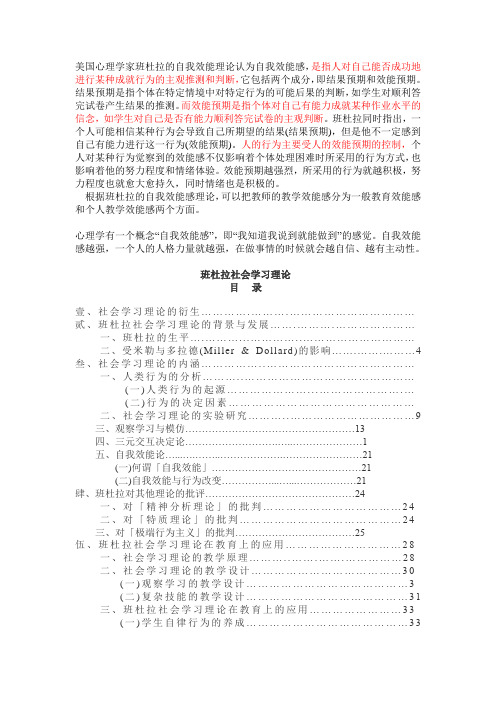
美国心理学家班杜拉的自我效能理论认为自我效能感,是指人对自己能否成功地进行某种成就行为的主观推测和判断,它包括两个成分,即结果预期和效能预期。
结果预期是指个体在特定情境中对特定行为的可能后果的判断,如学生对顺利答完试卷产生结果的推测。
而效能预期是指个体对自己有能力成就某种作业水平的信念,如学生对自己是否有能力顺利答完试卷的主观判断。
班杜拉同时指出,一个人可能相信某种行为会导致自己所期望的结果(结果预期),但是他不一定感到自己有能力进行这一行为(效能预期)。
人的行为主要受人的效能预期的控制,个人对某种行为觉察到的效能感不仅影响着个体处理困难时所采用的行为方式,也影响着他的努力程度和情绪体验。
效能预期越强烈,所采用的行为就越积极,努力程度也就愈大愈持久,同时情绪也是积极的。
根据班杜拉的自我效能感理论,可以把教师的教学效能感分为一般教育效能感和个人教学效能感两个方面。
心理学有一个概念“自我效能感”,即“我知道我说到就能做到”的感觉。
自我效能感越强,一个人的人格力量就越强,在做事情的时候就会越自信、越有主动性。
班杜拉社会学习理论目录壹、社会学习理论的衍生………….……….……………………………贰、班杜拉社会学习理论的背景与发展…….……….…………………一、班杜拉的生平….………...…………..…………………………二、受米勒与多拉德(Miller & Dollard)的影响 (4)叁、社会学习理论的内涵……………..…………………………………一、人类行为的分析………..………………………………………(一)人类行为的起源…………………...………………….…(二)行为的决定因素…………………………………………二、社会学习理论的实验研究 (9)三、观察学习与模仿 (13)四、三元交互决定论 (1)五、自我效能论 (21)(一)何谓「自我效能」 (21)(二)自我效能与行为改变 (21)肆、班杜拉对其他理论的批评 (24)一、对「精神分析理论」的批判 (24)二、对「特质理论」的批判 (24)三、对「极端行为主义」的批判 (25)伍、班杜拉社会学习理论在教育上的应用 (28)一、社会学习理论的教学原理 (28)二、社会学习理论的教学设计 (30)(一)观察学习的教学设计 (3)(二)复杂技能的教学设计 (31)三、班杜拉社会学习理论在教育上的应用 (33)(一)学生自律行为的养成 (33)(二)自律行为养成的心理历程 (33)陆、班杜拉社会学习理论的评价及应用范畴 (36)一、班杜拉社会学习理论摘要 (36)二、班杜拉社会学习理论对教育的贡献 (37)三、班杜拉社会学习理论在行为改变上的应用 (37)四、对班杜拉社会学习理论的评价 (37)柒、个人对班杜拉社会学习论的学习心得及感想 (39)捌、参考书目 (41)壹、社会学习理论的衍生教育是一种以学习为目的的活动,长久以来,心理学家对学习历程的改变,提出许多不同的解释和主张。
《自我效能理论及其应用》评介

潮 。我 国心 理 学界 在 2 0世 纪 9 0年代 就 开始 关 注这
一
现象 , 也做 了很多 研 究 , 多年 来 一直 没有 出现一 但
本 系统 的 、 能够综 合 中外 研究 的 、 既有 理 论 阐释 又有 实 际应 用 的精 品之作 。郭本 禹教 授 和姜 飞 月副 教授
的合著 《自我 效 能理论 及 其应 用 》 补 了这一Fra bibliotek不 足 。 弥
会认 知 理论 的逻 辑 延 伸 , 社 会 认 知 理 论 的 进 一步 是 拓 展 ; 外 部 因素来 看 , 从 自我效 能理论 的创 立 有着深 刻 的社 会 根 源 和其 他 理 论 思 想 的影 响 。在 第 二 章
中, 作者 系统 地 阐释 了 自我 效能理 论 的基本 原 理 , 分 析 了 自我效 能 的概 念 内涵 和 性 质 , 明了 自我 效 能 说
变 历程 不 仅体 现 了 班 杜拉 学 术 思 想 的发 展 , 体 现 也
为、 目标或 情 境选 择 , 响着人 们 行为 的坚 持性 和努 影
力 性 , 响着 人们 的行 为结 果 。 因此 , 影 它在 人们 的学 习 、 活或 工作 中发挥 非 常关键 的作用 。 生 这 一 现 象 及 概念 的提 出 , 引起 了心 理 学 家 们 的 极 大关 注 , 在 西方 世 界 兴 起 了 自我 效 能 研 究 的热 并
情绪调节自我效能感的应用研究

情绪调节自我效能感的应用研究一、概述情绪调节自我效能感,即个体对自己在情绪调节过程中能否成功执行特定行为的主观判断和信念,对于人的心理健康和日常生活具有重要影响。
近年来,随着积极心理学的兴起和人们对心理健康的日益关注,情绪调节自我效能感的研究逐渐成为心理学领域的热点之一。
本研究旨在探讨情绪调节自我效能感的应用研究,通过深入分析其在不同领域、不同人群中的应用效果,为提升个体的情绪调节能力、促进心理健康提供理论支持和实践指导。
具体而言,本研究将首先回顾情绪调节自我效能感的相关理论和研究现状,然后重点探讨其在教育、职场、心理咨询等领域的应用实践,最后对研究结果进行总结和展望,以期为未来研究提供借鉴和参考。
1. 情绪调节自我效能感的概念界定情绪调节自我效能感(Regulatory Emotional SelfEfficacy, RESE)是指个体在调节自身情绪方面的自信程度。
这一概念由Bandura 在自我效能感理论的基础上提出,它涉及到个体对自己能否有效管理、控制和调整自己情绪的能力的信念。
情绪调节自我效能感不仅仅是对自身情绪状态的认知,更是个体在面对不同情绪挑战时所展现出的自信和行动倾向。
情绪调节自我效能感包括认知重评和表达抑制两个方面。
认知重评是指个体在面对情绪刺激时,能够主动调整自己的认知评价,从而改变情绪反应的性质和强度。
表达抑制则是指个体通过抑制情绪表达行为来管理情绪,避免情绪的外显化。
这两种情绪调节策略在个体应对压力、挫折和日常生活中的各种情绪挑战时都起着重要作用。
情绪调节自我效能感对个体的心理健康和社会适应具有重要影响。
高情绪调节自我效能感的个体能够更好地应对生活中的情绪挑战,减少情绪困扰,提高心理健康水平。
同时,他们也更有可能在社交场合中表现出自信、积极和适应性强的特点,从而建立良好的人际关系,提高社会适应能力。
对情绪调节自我效能感的研究不仅有助于我们理解个体情绪调节的内在机制,还为心理健康教育和临床心理治疗提供了重要的理论依据和实践指导。
自我效能感相关研究文献综述

• • •
• •
3.自我效能感的影响效果 工业与组织心理学家研究自我效能感的影响效果 ,主要集中在三个方面:自我效能感与工作绩 效及相关工作行为的关系 ;自我效能感与相关工作态度的关系;自我效能感与职业紧张的关系。 (1)自我效能感 与绩效、 态度关系研究。国内外已有大量关于自我效能感与绩效之间的相关关系的研究 ,包括实证性研究、 探索性研究、 个案研 究以及文献研究等等 ,其研究结果都证明了自我效能感是预测绩效的最 佳指标之一。高的自我效 能感会促进绩效的提高 ,低的自我效能感则影响 绩效的增长。 [10] 高自我效能感的人会去尝试挑战性高的工 作 ,设置较高水平的目标 ,并表现出较强的目标承诺 ,从而提高工作 绩效。 [11] 同时 ,高自我效能感的人对自己的能力有信心 ,对生活的自我控制感也很强。而与之相反的是 ,低自我效能感的人对挑 战性的工作往往会采取回避态度 ,为自己设置的 目标也较低 ,对目标的承 诺也不高 ,从而影响到他 们的工作绩效。同时 ,他们对自己的能力常常持怀疑态度 ,因而对生活的自控能力也很弱。 一般来说 ,自我效能感高的个体 ,工作绩效通 常比较好 ,因此就会获得相应的报酬 ,也会 在组织 中有更多的职业发展机会。而自我效能感低的个体 ,由于其业绩平平 ,获得的报酬也比较少,晋升的可能性也不大。因此 ,自我效能感高的个体和自我效能感低的个体相比 ,会有更高的工作满意 度、
• • • • • •
•
• • • •
二、自我效能感理论的主要内容 综合班杜拉以及其他学者的研究,自我效能感理论研究的主要内容包含以下方面: 1. 影响自我效能感形成的因素和变量 自我效能感的形成主要来自四种不同的途径:以往的成败经验;他人的示范效应;社会劝说 ,情绪状况和生理唤起。[6] 这四种不同的自我效能感信息常常综合对自我效能的形成产生影响。 (1)以往的成败经验。以往成败的经验对于个体自我效能感的形成影响最大 ,成功的经验可以形成较高的自我效能感,失败的经验则可能降低个体的自我效能感,尤其是当个体尚未形成较强的自我效能感之 前。 [7]特别需要注意的是,最初的成功经验对于人们在今后取得更大的成就来说是很重要的 ,而这一点可以用在现代企业的管理中 ,管理者们可以将复杂的任务分解成几个阶段或小块,鼓励员工循序渐进、 一步步地完成每一个小任务 ,以此增加他们的成功经验 ,进而提高其自 我效能感 ,最终在今后的工作中获得更大的成功。 (2)替代性经验(示范效应) 。对于自我效能 感的形成有重要影响的是由那些社会“模范” 所提 供的替代性经验。 [7] 如果人们看到跟自己相似的 人通过持续的努力获得成功 ,他们就会相信自己 也有能力 成功。相反 ,对失败者的观察会使个体 怀疑自己进行相似活动的能力 ,进而会降低动机 水平。同时 ,班杜拉还强调了榜样与个体越相似 (如在年龄、 性别、 身体特征和教育等人口特征学 特征 ,以及地位 和经验等方面相似) ,要完成的工 作的关联性越大 ,对观察者自我效能感形成过程 的影响就越大;相反 ,如果观察者发现榜样跟自己 很不相同的话 ,那么榜样的行为选择以及所产生 的结果就不会对他们的自 我效能感的形成产生较 大的影响。 [7]我们平时所说的“榜样的力量是无穷的” ,指的就是示范的巨大效应。 (3)社会劝说。社会劝说是加强自我效能感 的信息来源之三。当人们被劝说他们拥有完成任 务和工作的能力时 ,他们更有可能投入更多的努 力和毅力坚持下来 ;当人们在做一项工作的过程 中开始感到举 步维艰或是怀疑自己的时候 ,这样的社会说服其作用就更加明显。因此 ,社会劝说的作用在自我效能感的形成过程中是不可忽视的。公司的管理者对绩优员工及时给予表扬和称赞 ,对于提高员工自我效能 感是很有帮助的;学校老师对于表现良好或者有进步的学生时不时地给 予言语表扬 ,对于提高学生的学习自我效能感来说也是很有必要的。当然 ,并非所有的表扬都会 提高自我效能感 ,也并非所有的批评 都会降低自 我效能感。贬低性的批评会降低自我效能感 ,而 建设性的批评反而会提高人们的自我效能感。 (4)情绪状况和生理唤起。班杜拉认为情绪 和生理状态也会影响自我效能感的形成。 [7] 人们在评估自己的能力时 ,常常会依赖于当时生理和 情绪上的感觉。他们往往将受到的压力视为是业绩不良的征 兆 ,而把耐力活动中的疲惫感和疼痛看作是生理缺陷。同时 ,情绪也会影响人们对自身能力的判断 ,积极的情绪状态可以增强自我效能感;消极的情绪状态则可能削弱自我效能感。 2. 自我效能感的功能 自我效能感直接影响到个体在执行某项活动的动力心理过程中的功能发挥 ,这种影响作用主要体现在以下四个方面 ,即行为选择、 动机性努力、 认知过程以及情感过程。 [8] (1)自我效能感影响人们的行为选择。正如 班杜拉所说 :“人在一定程度上是环境的产物;同 时 ,人们也通过自我效能感选择某些特定的活动 和环境 ,并对所处的环境加以改造。 ” [8] 人们尽量 回避进入 那些自认为超出自身能力的环境 ,而去选择自感可以应付的环境或活动。人们通过自己 所做的各种选择 ,培养出不同的技能、 兴趣和社会 关系网 ,而这些方面对其人生观和价值观的形成 有着重要的影响。 大量的研究结果显示 ,具有较低自我效能感 的人 ,在生活中面临挑战时 ,往往将其视为一种威 胁 ,因而采取回避的态度;具有较高自我效能感的 人 ,对于环境中的挑战则采取积极的应对态度 ,在 他们看来 , 正是这些挑战为其提供了各种学习新 技能的好机会。 (2)自我效能感影响人们动机性努力的程度。 当人们感觉自己在某项工作上有较高自我效能 时 ,就会干得更加卖劲;而如果认为自己在某项工 作上的效能较低时 ,就不会付出那么多的努力。 [9] (3)自我效能感影响人们的思维过程。当人们遇到困难和挫折时 ,他们的思考过程有可能是 自助性的 ,也可能是自我阻碍性的。那些拥有较高自我效能感的人 ,一般都会在脑海中勾勒出一 幅成功者的剧情 , 使他们采取更加积极主动的行动 ,他们所注意的焦点是怎样更好地解决问题;相反 ,那些低自我效能感的人 ,则总是在担心所有可能会出差错的地方 ,脑海中总是构造失败者的剧情 ,这样必然会降低其努力 水平。 [6] (4)自我效能感影响人们的情感过程。在面临可能的危险、 不幸、 灾难等厌恶性情境条件时 , 自我效能感决定了个体的应激状态、 焦虑反应和抑郁的程度等情感过程。这些情绪反应又通过改变思维过 程的性质而影响个体的活动及其功能发挥。高自我效能感的人 ,不会在应对环境事件之前忧虑不安。自我效能感弱的人 ,则怀疑自己处理、 控制环境的潜在威胁的能力 ,因而体验到强烈的应激状态和焦 虑唤起 ,并以各种保护性的退缩行为或防御行为被动地应对环境。这些行为方式 既限制了个体人格的发展 ,又妨碍了其主体性在活动中的功能发挥。
自我效能感理论及其研究综述

自我效能感理论及其研究综述作者:林玉庆来源:本站原创添加日期:09-07-12 19:58:14 点击:2495摘要:自我效能感理论是班杜拉社会学习理论体系的重要组成部分之一,也是其一般学习论观点的逻辑产物。
本综述主要介绍自我效能感理论的概念界定、形成机制、培养途径、相关领域的应用研究,在此基础上探讨自我效能理论的存在的问题和发展趋势。
关键词:自我效能感社会学习理论归因理论一、引言美国心理学家班杜拉于20世纪70年代在其著作《思想和行为的社会基础》一书中提出自我效能感的概念,并在其以后的著作中逐步形成了自我效能感理论的框架体系。
自我效能感被人们接受以后,广泛的应用在教育学、心理学和管理学领域,并取得了丰硕的成果。
二十多年来,人们围绕着自我效能感这一研究课题开展了广泛的研究,并在理论和实践成面上取得了一定的共识。
二、自我效能感的界定自我效能感是一个正在逐渐成熟的概念。
目前尚无共同认可的定义,不同的研究者有不同的界定。
综述已有研究我们可以概括自我效能感的定义主要有以下几个:自我效能感是一个正在逐渐成熟的概念。
目前尚无共同认可的定义,不同的研究者有不同的界定。
综述已有研究我们可以概括自我效能感的定义主要有以下几个:1、是指个体对自己能否在一定水平上完成某一活动所具有的能力判断、信念或主体自我把握与感受(A.Bandura,1986)。
2、是个体在面临某一活动任务时的胜任感及其自信、自珍、自尊等方面的感受(Schultz)。
3、是使个体能够有效的同周围世界打交道的一种人格(Barfield,1974)。
4、是个体对特定环境作出反应的一种心态(Ashton&Webb,1986)。
5、是个体对自己的行为影响成绩所持的有效或无效的感觉(C.Midgley)。
6、是个人对自己所从事某种工作所具能力以及对该工作可能做到地步的一种主观评价(张春兴,1991)。
7、是个体对自己能够进行某一行为的实施能力的推测或判断,它意味着人是否确信自己能够成功地进行带来某一结果的行为(周国韬、戚立夫,1993)。
班杜拉的社会学习理论及其应用

理 论 的 积 极 意 义
当然,班杜拉的社会学习理论也有其明显的不 足和局限性,这主要表现在以下几点: 第一,班杜拉的社会学习理论缺乏内在统一 的理论框架。该理论的各个部分较分散,如何将 彼此关联起来,构成一个有内在逻辑的体系,是 一个亟待解决的问题。 第二,班杜拉的社会学习理论是以儿童为研 究对象建立起来的,但他忽视了儿童自身的发展 阶段会对观察学习产生影响。 第三,班杜拉的社会学习理论虽然可以解释 间接经验的获得,但对于比较复杂的程序性知识, 以及陈述性知识和理性思维的形成缺乏说服力。 第四,班杜拉虽然强调了人的认知能力对行 为的影响,但对人的内在动机、内心冲突、建构 方式等因素没做研究,这表明其理论本身仍然有 较大的局限性。
企业管理
• 企业领导应充分看到员工与员工之间的互相影响, 主动在企业中树立员工榜样,利用榜样的作用激 发员工的工作热情、使员工更多的表现出企业所 希望的行为。在树立榜样时,企业领导要力求使 榜样真实可近、平凡感人。如果将榜样完美化、 理想化,常常会使员工感到高不可攀,或者感到 榜样脱离生活、虚假骗人。结果不仅不能起到激 励作用,反而会使员工反感,降低员工士气。
班杜拉的社会学习理论是在前人研究的 基础上,特别是行为主义学习理论研究的基 础上发展起来的,但他突破了旧的理论框架, 把行为主义、认知心理学和人本主义加以融 合,以信息加工和强化相结合的观点阐述了 学习的过程和机制,并把社会因素引人到研 究中。他所建立的社会学习理论开创了心理 学研究的新领域。 第一,班杜拉吸收了认知心理学的研究 成果,把强化理论与信息加工理论有机地结 合起来,以认知的术语阐述了观察学习的过 程和作用,提出了替代强化、自我强化、三 元交互、自我效能等概念,改变了传统行为 主义重刺激一反应,轻中枢过程的倾向,使 解释人的行为的参照点发生了重要的转变。 第二,班杜拉在社会学习理论研究中,注
班杜拉自我效能理论

美国心理学家班杜拉的自我效能理论认为自我效能感,是指人对自己能否成功地进行某种成就行为的主观推测和判断,它包括两个成分,即结果预期和效能预期。
结果预期是指个体在特定情境中对特定行为的可能后果的判断,如学生对顺利答完试卷产生结果的推测。
而效能预期是指个体对自己有能力成就某种作业水平的信念,如学生对自己是否有能力顺利答完试卷的主观判断。
班杜拉同时指出,一个人可能相信某种行为会导致自己所期望的结果(结果预期),但是他不一定感到自己有能力进行这一行为(效能预期)。
人的行为主要受人的效能预期的控制,个人对某种行为觉察到的效能感不仅影响着个体处理困难时所采用的行为方式,也影响着他的努力程度和情绪体验。
效能预期越强烈,所采用的行为就越积极,努力程度也就愈大愈持久,同时情绪也是积极的。
根据班杜拉的自我效能感理论,可以把教师的教学效能感分为一般教育效能感和个人教学效能感两个方面。
心理学有一个概念“自我效能感”,即“我知道我说到就能做到”的感觉。
自我效能感越强,一个人的人格力量就越强,在做事情的时候就会越自信、越有主动性。
班杜拉社会学习理论目录壹、社会学习理论的衍生………….……….……………………………贰、班杜拉社会学习理论的背景与发展…….……….…………………一、班杜拉的生平….………...…………..…………………………二、受米勒与多拉德(Miller & Dollard)的影响 (4)叁、社会学习理论的内涵……………..…………………………………一、人类行为的分析………..………………………………………(一)人类行为的起源…………………...………………….…(二)行为的决定因素…………………………………………二、社会学习理论的实验研究 (9)三、观察学习与模仿 (13)四、三元交互决定论 (1)五、自我效能论 (21)(一)何谓「自我效能」 (21)(二)自我效能与行为改变 (21)肆、班杜拉对其他理论的批评 (24)一、对「精神分析理论」的批判 (24)二、对「特质理论」的批判 (24)三、对「极端行为主义」的批判 (25)伍、班杜拉社会学习理论在教育上的应用 (28)一、社会学习理论的教学原理 (28)二、社会学习理论的教学设计 (30)(一)观察学习的教学设计 (3)(二)复杂技能的教学设计 (31)三、班杜拉社会学习理论在教育上的应用 (33)(一)学生自律行为的养成 (33)(二)自律行为养成的心理历程 (33)陆、班杜拉社会学习理论的评价及应用范畴 (36)一、班杜拉社会学习理论摘要 (36)二、班杜拉社会学习理论对教育的贡献 (37)三、班杜拉社会学习理论在行为改变上的应用 (37)四、对班杜拉社会学习理论的评价 (37)柒、个人对班杜拉社会学习论的学习心得及感想 (39)捌、参考书目 (41)壹、社会学习理论的衍生教育是一种以学习为目的的活动,长久以来,心理学家对学习历程的改变,提出许多不同的解释和主张。
自我效能理论评述
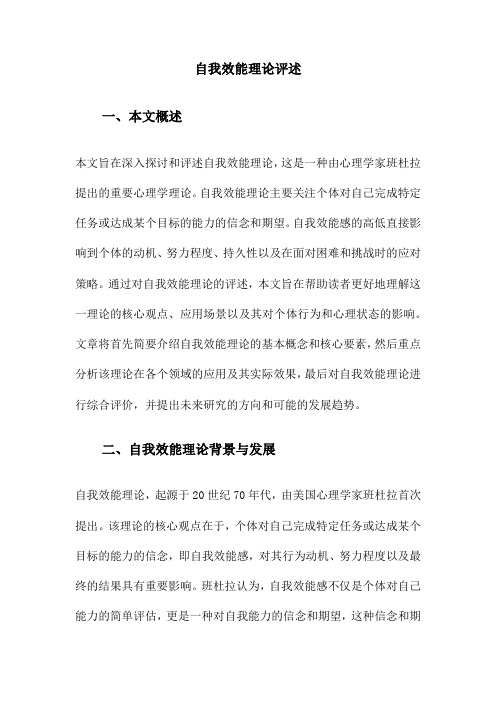
自我效能理论评述一、本文概述本文旨在深入探讨和评述自我效能理论,这是一种由心理学家班杜拉提出的重要心理学理论。
自我效能理论主要关注个体对自己完成特定任务或达成某个目标的能力的信念和期望。
自我效能感的高低直接影响到个体的动机、努力程度、持久性以及在面对困难和挑战时的应对策略。
通过对自我效能理论的评述,本文旨在帮助读者更好地理解这一理论的核心观点、应用场景以及其对个体行为和心理状态的影响。
文章将首先简要介绍自我效能理论的基本概念和核心要素,然后重点分析该理论在各个领域的应用及其实际效果,最后对自我效能理论进行综合评价,并提出未来研究的方向和可能的发展趋势。
二、自我效能理论背景与发展自我效能理论,起源于20世纪70年代,由美国心理学家班杜拉首次提出。
该理论的核心观点在于,个体对自己完成特定任务或达成某个目标的能力的信念,即自我效能感,对其行为动机、努力程度以及最终的结果具有重要影响。
班杜拉认为,自我效能感不仅是个体对自己能力的简单评估,更是一种对自我能力的信念和期望,这种信念和期望能够影响个体的行为选择、努力程度以及面对困难时的持久性。
随着研究的深入,自我效能理论得到了不断的发展和完善。
一方面,研究者们对自我效能感的来源进行了深入探讨,认为它主要来源于个体过去的成功经验、他人的替代性经验、言语劝说以及生理和心理状态等因素。
另一方面,自我效能感在不同领域的应用也得到了广泛研究,如教育领域、职业领域、心理健康领域等。
在教育领域,自我效能感被认为是影响学生学习动机和成绩的重要因素。
研究表明,具有高自我效能感的学生更倾向于选择具有挑战性的任务,并在面对困难时表现出更高的坚持性和努力程度。
因此,教育者可以通过提供成功的体验、设置合适的目标、给予积极的反馈等方式来提高学生的自我效能感,从而提高他们的学习动力和成绩。
在职业领域,自我效能感对个体的职业选择、职业发展以及工作绩效也具有重要影响。
具有高自我效能感的员工更有可能选择具有挑战性的工作,并在工作中表现出更高的创造性和适应性。
自我效能感研究综述及其应用
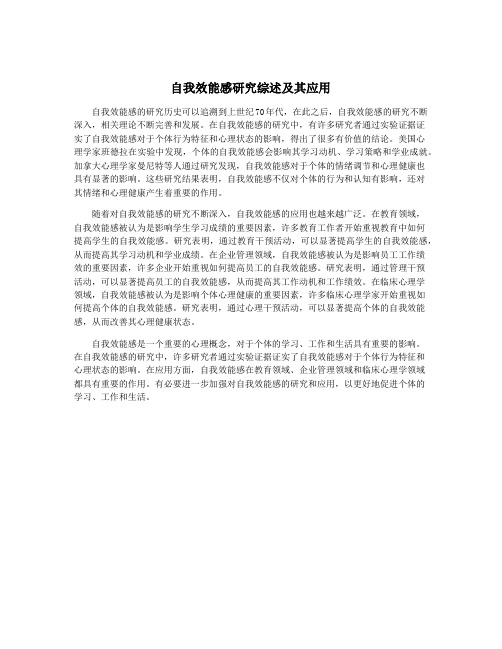
自我效能感研究综述及其应用自我效能感的研究历史可以追溯到上世纪70年代,在此之后,自我效能感的研究不断深入,相关理论不断完善和发展。
在自我效能感的研究中,有许多研究者通过实验证据证实了自我效能感对于个体行为特征和心理状态的影响,得出了很多有价值的结论。
美国心理学家班德拉在实验中发现,个体的自我效能感会影响其学习动机、学习策略和学业成就。
加拿大心理学家曼尼特等人通过研究发现,自我效能感对于个体的情绪调节和心理健康也具有显著的影响。
这些研究结果表明,自我效能感不仅对个体的行为和认知有影响,还对其情绪和心理健康产生着重要的作用。
随着对自我效能感的研究不断深入,自我效能感的应用也越来越广泛。
在教育领域,自我效能感被认为是影响学生学习成绩的重要因素,许多教育工作者开始重视教育中如何提高学生的自我效能感。
研究表明,通过教育干预活动,可以显著提高学生的自我效能感,从而提高其学习动机和学业成绩。
在企业管理领域,自我效能感被认为是影响员工工作绩效的重要因素,许多企业开始重视如何提高员工的自我效能感。
研究表明,通过管理干预活动,可以显著提高员工的自我效能感,从而提高其工作动机和工作绩效。
在临床心理学领域,自我效能感被认为是影响个体心理健康的重要因素,许多临床心理学家开始重视如何提高个体的自我效能感。
研究表明,通过心理干预活动,可以显著提高个体的自我效能感,从而改善其心理健康状态。
自我效能感是一个重要的心理概念,对于个体的学习、工作和生活具有重要的影响。
在自我效能感的研究中,许多研究者通过实验证据证实了自我效能感对于个体行为特征和心理状态的影响。
在应用方面,自我效能感在教育领域、企业管理领域和临床心理学领域都具有重要的作用。
有必要进一步加强对自我效能感的研究和应用,以更好地促进个体的学习、工作和生活。
自我效能

1
人类生活的环境复杂多变,不管是生活、学习还是工作中 都常常会遇到不同的困难、问题和挑战。因此人们如何调节自 己,应对环境的复杂变化成为了许多学者关注的问题,如罗特
(J. Rotter)的控制点理论、麦克兰德(D. McClelland)等人的
成就动机理论等,都企图探究和解释人类对其能力的直觉信念 与适应和调节等心理和行为的关系。其中以美国著名心理学家 班杜拉于1977年首创的自我效能理论(self-efficacy theory)最 具影响力。
“人们对完成任务所需行动的过程、动机和认识资源的能力
的信念”,此后,班杜拉(1997)又将其定义为“人们对其 组织和实施达成特定成就目标所需行动过程的能力的信念”。
1998年,斯塔科维奇和鲁森斯给出了更广泛、实用性更强的
定义:“自我效能是指个体对自己能力的一种确切的信念 (或自信心),这种能力使自己在某个背景下为成功地完成
为对自我效能的测量必须考虑领域特殊性,另一种则认为应
该具备一般普适性。
25
2、自我效能测量的维度
就自我效能的测量,或一个自我效能量表的结构而言,班杜
拉认为,主要围绕三个维度进行,即水平、强度和广度。 自我效能的水平表明,不同个体的自我效能感受到不同难度、
复杂度的活动要求的限制。
自我效能的强度表明,在一个标准的自我效能测量中,要给 被试呈现刻画不同水平的任务,要求被试对其完成所要求的
某项特定任务,能够调动起我效能产生的理论背景和内涵可以看出,自我效能
感其实质是“个体以自身为对象的思维(self-referent thought)
的一种形式” 。作为主体因素的一个重要方面,它展现了个 体对自己能否在一定水平上完成某一活动所具有的能力判断、
自我效能感的理论及研究现状
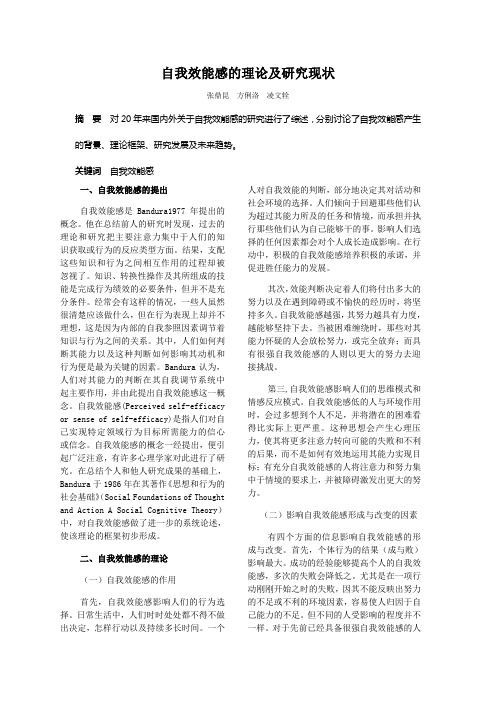
自我效能感的理论及研究现状张鼎昆方俐洛凌文辁摘要对20年来国内外关于自我效能感的研究进行了综述,分别讨论了自我效能感产生的背景、理论框架、研究发展及未来趋势。
关键词自我效能感一、自我效能感的提出自我效能感是Bandura1977年提出的概念。
他在总结前人的研究时发现,过去的理论和研究把主要注意力集中于人们的知识获取或行为的反应类型方面。
结果,支配这些知识和行为之间相互作用的过程却被忽视了。
知识、转换性操作及其所组成的技能是完成行为绩效的必要条件,但并不是充分条件。
经常会有这样的情况,一些人虽然很清楚应该做什么,但在行为表现上却并不理想,这是因为内部的自我参照因素调节着知识与行为之间的关系。
其中,人们如何判断其能力以及这种判断如何影响其动机和行为便是最为关键的因素。
Bandura认为,人们对其能力的判断在其自我调节系统中起主要作用,并由此提出自我效能感这一概念。
自我效能感(Perceived self-efficacy or sense of self-efficacy)是指人们对自己实现特定领域行为目标所需能力的信心或信念。
自我效能感的概念一经提出,便引起广泛注意,有许多心理学家对此进行了研究。
在总结个人和他人研究成果的基础上,Bandura于1986年在其著作《思想和行为的社会基础》(Social Foundations of Thought and Action A Social Cognitive Theory)中,对自我效能感做了进一步的系统论述,使该理论的框架初步形成。
二、自我效能感的理论(一)自我效能感的作用首先,自我效能感影响人们的行为选择。
日常生活中,人们时时处处都不得不做出决定,怎样行动以及持续多长时间。
一个人对自我效能的判断,部分地决定其对活动和社会环境的选择。
人们倾向于回避那些他们认为超过其能力所及的任务和情境,而承担并执行那些他们认为自己能够干的事。
影响人们选择的任何因素都会对个人成长造成影响。
自我效能理论

②激活水平 情绪和身体反应的绝对强度并不重要, 重要的是人们对其得知觉和解释。 一般来说,中等程度的唤起提高注意力 并促进技能的有效运用,而高度唤起则破 坏活动的性质。 最佳激活水平有赖于活动的复杂性。
③心情对自我效能判断的影响 心情由于常常与活动性质的改变相伴, 而成为个人效能判断的另一个感情信息来 源。心情状态会使注意具有偏向性,并影 响人们对时间的解释、认知组织和记忆提 取。引发的积极心情增强效能知觉,沮丧 心情则相反。引发的心情越激烈,对效能 信念的影响越大。 研究已证明,引发的心情对效能信念的 影响广泛而普遍,并非局限在体验快乐或 悲伤的特定领域中。
班杜拉的社会学习理论体系是对他的一般学 习论观点的理论展现。他的一般学习论观点是他 对人性及其因果决定模式的理智把握,在理论形 态上表现为三元交互决定论。三元交互决定论探 讨的是环境、行为以及表现为思维、认知、自我 评价等的人的主体因素之间的交互决定关系。对 行为主义传统的心理学研究而言,三元交互决定 论中的人的主体因素及其作用机制,构成了它的 一片尚待开垦的荒芜之地,因为在行为主义的任 何传统形式的理论体系中,人是没有自我的。纵 观班杜拉学术思想的发展,70年代末以前,他主 要从事于对其一般学习论观点的阐释并建构其观 察学习理论;当他的一般学习论观点确立后,自 80年代以来,他的学术兴趣便转向对现象的全面 考察,特别典型地表现为对自我效能现象的关注。
60年代初期,随着认知心理学迅速崛 起,行为主义理论的①实证主义哲学基础, ②严格的环境决定论,③ 人和动物不分的 观点,遭到越来越多的反对。 在这种历史条件下,一部分新行为主 义者既不愿重蹈传统心理学的覆辙,又不 愿寄居于认知心理学门下,他们给予认知、 思维等心理因素以足够的重视,把认知、 思维看成是积极主动的过程,这种吸收了 认知心理学观点,走折中道路的行为主义 就是----
学业自我效能感及其对教育教学的启示word资料3页
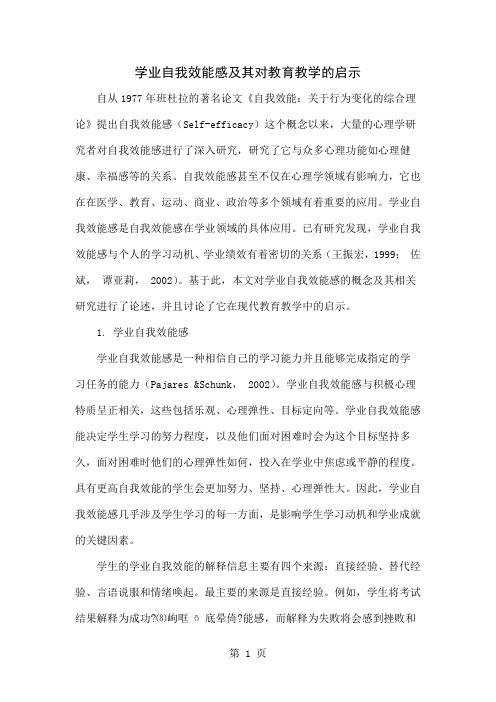
学业自我效能感及其对教育教学的启示自从1977年班杜拉的著名论文《自我效能:关于行为变化的综合理论》提出自我效能感(Self-efficacy)这个概念以来,大量的心理学研究者对自我效能感进行了深入研究,研究了它与众多心理功能如心理健康、幸福感等的关系。
自我效能感甚至不仅在心理学领域有影响力,它也在在医学、教育、运动、商业、政治等多个领域有着重要的应用。
学业自我效能感是自我效能感在学业领域的具体应用。
已有研究发现,学业自我效能感与个人的学习动机、学业绩效有着密切的关系(王振宏,1999;佐斌,谭亚莉, 2002)。
基于此,本文对学业自我效能感的概念及其相关研究进行了论述,并且讨论了它在现代教育教学中的启示。
1. 学业自我效能感学业自我效能感是一种相信自己的学习能力并且能够完成指定的学习任务的能力(Pajares &Schunk, 2002)。
学业自我效能感与积极心理特质呈正相关,这些包括乐观、心理弹性、目标定向等。
学业自我效能感能决定学生学习的努力程度,以及他们面对困难时会为这个目标坚持多久,面对困难时他们的心理弹性如何,投入在学业中焦虑或平静的程度。
具有更高自我效能的学生会更加努力、坚持、心理弹性大。
因此,学业自我效能感几乎涉及学生学习的每一方面,是影响学生学习动机和学业成就的关键因素。
学生的学业自我效能的解释信息主要有四个来源:直接经验、替代经验、言语说服和情绪唤起。
最主要的来源是直接经验。
例如,学生将考试结果解释为成功?⑻岣哐б底晕倚?能感,而解释为失败将会感到挫败和无助感。
替代经验发生在学生对他人行为的观察,当观察到相似他人的行为会内化成为自己的经验。
学业自我效能也通常被来自他人的说服和,有效的说服能促进学生对自己能力的自我效能信念。
最后,情绪状态能提供关于自我效能感的信息,学生可以通过自己的情绪状态了解他们在任务和活动中的信心。
2.学业自我效能感对教育教学的启示正如班杜拉强调的那样,教育实践应标准不仅是传授给他们知识和技能,而且要培养们对他们的能力的信念,这影响他们如何看待未来。
自我效能感_概念_理论和应用_周文霞

了 。 知识和技能是完成行为绩效的必要条件 , 但 并不是充分条件 。 经常会有这样的情况 , 一些人 虽然很清楚应该做什么 , 但在行为表现上却并不 理想 , 这是因为内部的自我参照因素调节着知识 与行为之间的关系 。 其中 , 人们如何判断其能力 以及这种判断如何影响其动机和行为便是最为关 键的因素 。 班杜拉凭 借着他对人性 及其因果决 定模式 ( 三元交互决定论 — — —个体 、 环境与行动三者之间 的交互决定论) 的理智把握 , 在认知心理学的影响 下 , 提出了自我效能感的概念 , 对这一中介过程做 出了理论解释 。 班杜拉认为 , 所谓自我效能感 , 是 指“ 人们对自身能否利用所拥有的技能去完成某 项工作行为的自信程度”
中国人民大学学报
JO U RN A L O F REN M IN UN IV ERSIT Y OF CHIN A
2006 年第 1 期 No . 1 2006
自我效能感 : 概念 、理论和应用
周文霞 , 郭桂萍
( 中国人民大学 劳动人事学院 , 北京 100872)
[ 摘 要 ] 自我效能感是指人们对自身能否利用所拥 有的技能 去完成某项 工作行为的 自信程度 。 一个 人以往的成败经验 、 他人的示范效应 、社会劝说 、 情绪状况 和生理唤起四种途径对自我效能感的形成综合发挥 作用 。 自我效能感影响人的行为选择 、 动机性努力 、认知过程 以及情感 过程 。 加强自我 效能感对 于提高工 作 绩效 、 增强工作动机 、改善工作态度都有重要意义 。 [ 关键词 ] 自我效能感 ; 概念 ; 理论 ; 应用 [ 中图分类号 ] B849 [ 文献标识码 ] A [ 文章编号 ] 1000-5420( 2006) 01-0091-07
[ 3] [ 2]
自我效能理论及其在学校教育中的应用

摘
要 自我效能理论在诸多领域都得到 了广泛应用. 学校 在
教育情境 中。 我 效能主要有 三种作 业方式: 自 学生对调节 自 学 习。 身 掌握学业的效能信念 ;教师对激发和提 高学生 学习的个体 效能信 念; 教师集体对 影响有效学校特性和调节教师心理和行 为的集体效 能信念 。这三种效能作用分别 通过 学生、 师和 学校集体影响到学 教 生的学业发展和心理社会成长、 师和 学校 的发展。 自 教 我效能理论 要求学校教育应重视培养 学生 自我效能. 同时应 重视教 师个 体和集
22教师对激发和提高学生学习的个体效能信念 . 教师 的个 体效能信 念包括 了教师 的心理学家班杜拉于 17 9 7年首 次提 出 “自我效能”这一概
念。 随后他又进一步发展和完善了 自 我效 能感理论 。自我效能理论 在诸多领域内得到了广泛的应用 。本文着 重论述 自我效 能理论在
败发生在效能感牢 固地建立之前 ) 则削弱它。二是 替代性经验 。与
自己相似的榜样 的成功会提高个体对 类似活动的效能信念, 反之会 降低个体对效能 的判断。 三是社会说服 。 社会评价 和他人言语的说 服, 响个体 的效能信念的建 立。 会影 四是生理和情绪状态。 心境和个 体生理疲劳 、 疼痛都 影响着个体 的效 能判断, 到个体 的效 能信 影响
不是单独起作用。
() 1 教师集体效 能对有效学校特性 的影响。在学校的组织水平 上, 识别与学校学业成就差异有关 的组织特征对于缩短不同类 型学 校之间的差异、 促进学 校的有效发展具有特别重要的意义。只有弄 清学校组织特性与学生学业成就之间的相互 作用过 程 , 我们才可 以
对学校的学业成就水平进行有效干预 , 以使不同的学校都具有有效 学校的关键 特征 。依据 自我效能理论 , 在学校水平 上教师集体效能
心理学中的自我效能理论

心理学中的自我效能理论自我效能理论是心理学中的一个重要理论,它在很大程度上揭示了人类自我评价和信念系统的形成和变化机制。
本文将深入探讨该理论的内涵、特征、形成机制以及其对实际生活中个人和组织的影响,并分析当前研究景观和未来研究的方向。
一、自我效能理论的内涵和特征自我效能理论指的是个体对自己能力的评估和对控制自己生活的信念,它是由加拿大心理学家阿尔伯特·班杜拉(Albert Bandura)于20世纪70年代提出的。
自我效能理论最主要的特征在于,它并不是单纯关注个体的能力水平,而是注重个体对自己的能力以及能否实现目标的信念。
自我效能与人的成长、学习和成就紧密相关。
自我效能理论的核心包括三个方面:自我评价、信念系统和行为。
首先,个体的自我评价指的是个体自身在各种任务中的能力和表现。
其次,信念系统指的是个体对自己的能力和实现目标的信念,包括目标设定、对任务的期望以及评估标准。
最后,行为指的是个体在不同任务中的行动和表现。
自我效能理论主要有以下特征:第一,自我效能与任务性质密切相关,不同类型的任务对自我效能的影响也不同。
第二,自我效能可以预测个体的行为选择、信心程度和成就表现。
第三,个体自我效能的形成机制复杂多样,不仅与个体的认知、情感和行为有关,也与社会环境和文化背景有关。
二、自我效能理论的形成机制自我效能的形成相对复杂,与个体的认知、情感和行为以及社会环境和文化背景等因素有关。
具体包括以下几个方面:1. 经验影响:个体在完成任务时的实际表现会影响自我效能的形成。
表现得好会加强自我效能信念,表现不佳则会削弱其信念。
2. 视觉体验:同龄人的成就或成功的经验可以通过观察学习来提高自我效能信念。
3. 情感因素:自我效能的形成与个体的情感状态密切相关,例如焦虑和压力会降低自我效能。
4. 语言与社会因素:他人的评价和社会反馈会影响自我效能信念的形成。
三、自我效能理论在实际生活中的应用自我效能理论在实际生活中有着广泛的应用,对不同领域的个人和组织都有着重要的影响。
班杜拉自我效能理论对学习策略教学的启示

班杜拉自我效能理论对学习策略教学的启示自我效能感源于美国行为主义心理学家班杜拉的社会认知理沦。
它是指一个人对自己能否成功地完成一项任务所持的信心和期望,或者是对自己成功地完成一项任务所具备的潜能认识。
班杜拉认为:人对自己的行为除了结果期待外,还有效能的期待。
班杜拉自我效能理论对学习策略教学的启示:问题的提出:以往关于学习策略教学的研究认为,教师除了使学生获得学习策略外,还应让学生懂得为什么、何时何地运用某策略及其不足之处。
由此提出了盲目训练法、感受训练法、感受自控法等(A.Brown,1983)旨在对学生进行元认知训练的方法。
但研究进一步发现,学生可能知道何时何地使用何策略,但如果他不愿使用这些策略,就好比一个人家中有许多书而不去看一样。
于是提出教师一定要给学生一些机会是他们感受策略的有效性,并要教给学生积极主动激励自己学习动机的策略,以提高学生的学习能力能自觉、自动灵活地进行学习的调节和控制———学习策略教学的目的。
其中也有提到“要树立学习策略学习的自我效能感,让学生有信心学好学习策略”,但学习与运用毕竟是两回事,而我们教学的最终目的是学习策略的有效运用。
国外的一些研究认为,学习策略教学效果欠佳的原因之一是学习策略的教学技术不够完善。
因此提出了进行元认知学习调节与控制的明晰教学的四种教学技术:(1)自我管理教学,仅让学生自己运用具体的学习方法。
(2)规划教学,明晰地告诉学生如何使用具体方法并示范。
(3)规则与自我管理相结合的教学。
(4)控制与监视教学:告知如何使用学习方法,何时、如何检查学习策略的使用,还应增加明晰的教学反馈及提供足够的教学时间,以使学生了解学习策略的效用、保证策略使用的自动化。
以上关于学习策略教学的研究旨在解决的问题都是:学生即使学会了某些学习策略,但仍依赖过去形成的学习习惯和策略,或不知如何根据具体的学习情境灵活选用合适的策略。
因此,我们的教学应让学生感受策略的有效性,懂得如何灵活运用。
自我效能感理论及其研究现状

《教学与管理》!""#年$月!"日自我效能理论最早由班杜拉于!"世纪%"年代后期提出,是其社会学习理论体系的重要组成部分,也是其关于一般学习理论的逻辑产物,并构成了对其一般学习理论观点的理论逻辑的历史方式的实现。
一、自我效能理论基本内容自我效能感是指个体在执行某一行为操作之前对自己能够在什么水平上完成该行为活动所具有的信念、判断或主体自我把握与感受。
它不仅与一个人拥有的知识技能相联系,而且与一个人能否利用自己所占有的知识技能相联系。
自我效能理论迄今还未形成较完整的体系,基本理论框架如下。
&’自我效能感的功能自我效能感影响或决定人们对行为的选择,以及对该行为的坚持性和努力程度;影响人们的思维模式和情感反应模式,进而影响新行为的习得和习得行为的表现。
!’自我效能感形成或改变的因素(&)成败经验。
一般而言,成功的经验能提高个人的自我效能感,多次的失败会降低自我效能感。
但这还要受个体归因方式的影响。
(!)替代性经验。
人们通过观察他人的行为而获得的间接经验会对自我效能感产生重要影响。
($)言语劝说。
言语劝说的价值取决于它是否切合实际。
缺乏事实基础的言语劝说对自我效能感的影响不大,在直接经验或替代性经验基础上进行劝说的效果会更好。
(()情绪反应和生理状态。
个体在面临某项活动任务时的心身反应、强烈的激动情绪通常会妨碍行为的表现而降低自我效能感。
(#)情境条件。
不同的环境提供给人们的信息是大不一样的。
某些情境比其他情境更难以适应和控制。
当一个人进入陌生而又易引起焦虑的情境中时,其自我效能感水平与强度就会降低。
$’自我效能感的主体作用机制班杜拉认为自我效能感是通过选择、思维、动机和心身反应等中介过程而实现其主体作用机制的。
(&)选择过程。
一般而言,个体选择自以为能有效应付的环境,回避自感无法控制的环境,而这些环境因素反过来又会影响其行为技能和人格的发展。
- 1、下载文档前请自行甄别文档内容的完整性,平台不提供额外的编辑、内容补充、找答案等附加服务。
- 2、"仅部分预览"的文档,不可在线预览部分如存在完整性等问题,可反馈申请退款(可完整预览的文档不适用该条件!)。
- 3、如文档侵犯您的权益,请联系客服反馈,我们会尽快为您处理(人工客服工作时间:9:00-18:30)。
四种不同的模仿方式
(一)直接模仿(direct modeling): 直接模仿行为、技能
(二)综合模仿(synthesized modeling): 综合多次所见,形成自己的行为
(三)象征模仿(symbolic modeling): 模仿行为所代表的意义。
(四)抽象模仿(abstract modeling ): 模仿抽象原則,而非具体行为
言语劝说(verbal persuasion)
指通过他人的指导、建议、解释及鼓励等来改变 人们的自我效能
在直接经验或替代经验的基础上进行劝说、鼓 励,效果最好
当评价来自于有威信或对个体来说比较重要的 人时效果较好
The most important
Encourage, praise ,admire your patients at any stage by their own agenda.
自我效的作用
个体在行动前对自身完成该活动有效性的一种主观评估,这 种预先的估计对后续的行为会多方面地发生影响。
自我效能感影响人们的行为选择。 影响面对困难时的坚持性和努力程度 自我效能感影响人们的思维模式和情感反应模式。
Personal efficacy beliefs
Teaching efficacy, Learning efficacy, Writing efficacy
来自情绪和生理状态的信息
紧张、焦虑容易降低人们对自我效能的判断 生理状况差时自我效能感也会降低
但是人的一切行为都是主客观相互作用的产 物,外部的经验与主观的认知对自我效能感的 形成都有很大的影响作用。
如何评价自我效能?
Parenting efficacy I can quit smoking. (You can start naming
them) I can learn English I can get over my phobias
building self-efficacy
有四个因素影响到人的自我效能的形成和 改变(Bandura)
Triadic Reciprocality Model
three bi-directional arrows depicts a dynamic reality Within this system, self
efficacy helps determine what people decide to do (based on their capability beliefs) self-regulation helps them to set, monitor, and control their goals and motivation.
Self care
Health promotion
Self-care?
……..Self care includes the actions people take for themselves, their children and their families to stay fit and maintain good physical and mental health; meet social and psychological needs; prevent illness or accidents; care for minor ailments and longterm conditions; and maintain health and wellbeing after an acute illness or discharge from hospital. (DoH A Real Choice Self Care Support)
Bandura’s most famous experimental research studies : “Bobo doll” studies
感謝您長得比我高 讓我知道我有一天也可以像你一樣
影响观察学习的条件
➢ 榜样是学习者认同的人。 ➢ 榜样的行为受到了表扬或惩罚。 ➢ 榜样与学习者在人格特征上有相似之处。 ➢ 榜样与学习者在面对的问题上有相似之处。 ➢ 模仿的行为明确。 ➢ 模仿的行为是学习者能力所能及者。
Self-Efficacy Versus Other Constructs
“Self-efficacy as a judgment of personal capability is not self-esteem, which is a judgment of self-worth, nor is it locus of control, which is a belief about whether outcomes flow from behavior or from extraneous forces” (2005)
Health belief model (HBM) Transtheoretical model (TTM) Theory of Reasoned Action Theory of Planned Behavior
Methods of behaviour change
➢ Caregiver could be involved in using these behaviour change techniques to enhance self care.
Key Concept in SCT: Self-Efficacy
Self-efficacy, as a refined construct, came relatively late in Bandura’s thinking.
Bandura’s noticed a characteristic of successful people in all phases of life. It was various selfefficacy beliefs that let to their successes.
Four key processes or steps to observational learning:
1. Attention 2. Symbolic representation and retention 3. Transformation to action or production 4. Motivation
自我效能理论及其应用
Living with longstanding
conditions 2005
Professional care
Ratio of Shared Professional Care to Self Care across the Chronic Illness Population base
➢ Sources of self-efficacy (behaviour change technique). ➢ 自我效能感是Bandura,A.1977年提出的概念。在总结个人
和他人研究成果的基础上,他于1986年在其著作《思想和 行为的社会基础》中,对自我效能感做了进一步的系统论 述,使该理论的框架初步形成
Can intervening on the caregiver enhance self-care of patients and their caregivers?
Theories on behavior change
Knowledge-attitude-belief-practice (KAP or KABP)
“Self-efficacy is a person’s belief in their ability to produce desired results by their own actions.”
Successful people usually have high self-efficacy.
个体行为的结果(成与败) 人们从观察别人所得到的替代性经验(榜样病
人的作用) 他人的评价、劝说及自我规劝 来自情绪和生理状态的信息
个体行为的结果
行为表现的成果是提高自我效能的最可 靠来源。 成功的经验可以增加一个人对自身能力 的效能預期。 重复失败則会降低自我效能。
替代性经验的观察学习
humans can learn by observing and modeling others, especially those that they identify with.
